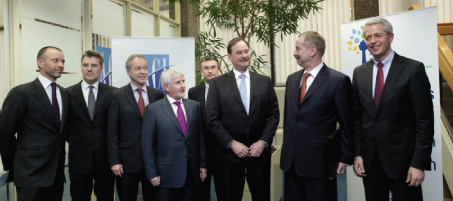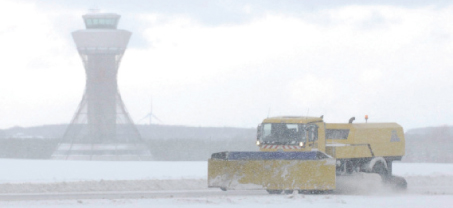
L-R: Olivier Jankovec, Director General, ACI EUROPE; Yiannis Paraschis, CEO, Athens International Airport; Jürg Rämi, Managing Director, EuroAirport Basel Mulhouse Freiburg; Declan Collier, CEO, Dublin Airport Authority and First Vice President, ACI EUROPE; François Rubichon, Deputy CEO, Aéroports de Paris and Vice President, ACI EUROPE; Ad Rutten, COO, Schiphol Group and ACI EUROPE President; Siim Kallas, European Commission Vice-President responsible for transport; and Stefan Schulte, CEO, Fraport and Vice President, ACI EUROPE.
Ask anyone working in European aviation and they will all tell you that 2010 was the year of seeming endless bad surprises. Early hopes for green shoots turning into a strong traffic recovery vanished quickly, as the industry’s bottom line was pummelled by the volcanic ash crisis, the sovereign debt crisis, industrial action by airline and air traffic control staff, new security threats and last, but not least, the extreme weather conditions which affected transport links in a number of countries in December.
Ad Rutten, COO, Schiphol Group and ACI EUROPE President, reflected on these in his introductory remarks. Declan Collier, CEO, Dublin Airport Authority and First Vice President, ACI EUROPE, echoed Rutten’s remarks and addressed some of the future challenges affecting Europe’s airports in the context of increasing competition from the Middle East and Asia. He stressed the need for airports to develop additional capacity not just to remain competitive, but also to have the necessary operational flexibility to better overcome disruptions. Moreover, the ability to access finance and attract private investment will be crucial. The EU regulatory environment also needs to reduce pressures on operating costs, while providing new business opportunities through aviation liberalisation beyond Europe, he said.
Transport White Paper
The agenda included the forthcoming White Paper on the Future of Transport, which was still in development when the meeting occurred and as this magazine goes to print, and has yet to be adopted by the European Commission. Kallas explained that the Single European Sky programme is the key element of the White Paper in terms of aviation. The Board of ACI EUROPE asserted that airports have a vital role to play as ground coordinators in the Single European Sky and, as such, need to be empowered to be in control of their infrastructure. Rutten said that, in addition to the SES, this is pertinent to airport slots and ground handling – both of which will be included in the Airport Package to be adopted by the European Commission this summer. Importantly, as was amply demonstrated by the recent severe weather conditions, airports must be empowered to set minimum service and quality requirements for ground handlers.
On the matter of winter operations and the European Commission’s criticism of airports’ handling of the extreme snow, the ACI EUROPE Board took the opportunity to challenge Vice President Kallas’ misperceptions about airports and emphasise the extensive planning airports undertake for weather disruptions.

The Board of ACI EUROPE underlined that the extreme snowfall which affected parts of Ireland, the UK, France, Belgium and Germany was the worst in 40 years in some cases, disrupting not just air travel, but all modes of transport and many public utilities.
The Board of ACI EUROPE stated that the extreme snowfall which affected parts of Ireland, the UK, France, Belgium and Germany was the worst in 40 years in some cases, disrupting not just air travel, but all modes of transport and many public utilities. The fact that it occurred at a peak period for holiday travel, with minimal spare airline capacity available, further compounded the impact on air passengers.
ACI EUROPE highlighted the fact that even at its worst moment, Europe’s airports were able to ensure that more than 85% of flights were unaffected during the severe weather. Furthermore, they ensured that passenger safety was uncompromised, with no accidents reported. The Board also clarified areas of responsibility, emphasising that incidents such as shortages of aircraft de-icing gel under the current European legislative framework, are mainly dependent on the actions of ground handlers and on the production and supply chain being guaranteed.
The Board also pointed to the collaborative nature of aviation and how no decision is taken in isolation. One example raised by Kallas was the provision of information to passengers. ACI EUROPE unequivocally insisted that this is primarily the responsibility of the airlines, and airports cannot automatically know whether flights are cancelled – they rely on the airline sharing that information as promptly as possible.
Kallas’ overall response was to state that he would refrain from legislative intervention, if the industry could deliver self-improvements.
Liquids, Aerosols & Gels
On the subject of the 29 April deadline for the first phase removal of restrictions on liquids, aerosols and gels (LAGs), Kallas was adamant that this deadline would not be moved. The ACI EUROPE Board presented its concerns that the deadline is over-ambitious, and will result in lower security and a deterioration in the passenger experience, particularly at Europe’s hubs.
Environment
On the environment, Kallas conveyed his enthusiasm for Airport Carbon Accreditation, to which he has publicly stated his support a number of times, even participating in the certification ceremonies of several airports. The ACI EUROPE Board thanked him for this support. It also relayed the need for policy at European level to reconcile the growth of aviation with the EU’s own ambitious environmental agenda. Kallas expressed interest in meeting with ACI EUROPE and other industry stakeholders this autumn.







